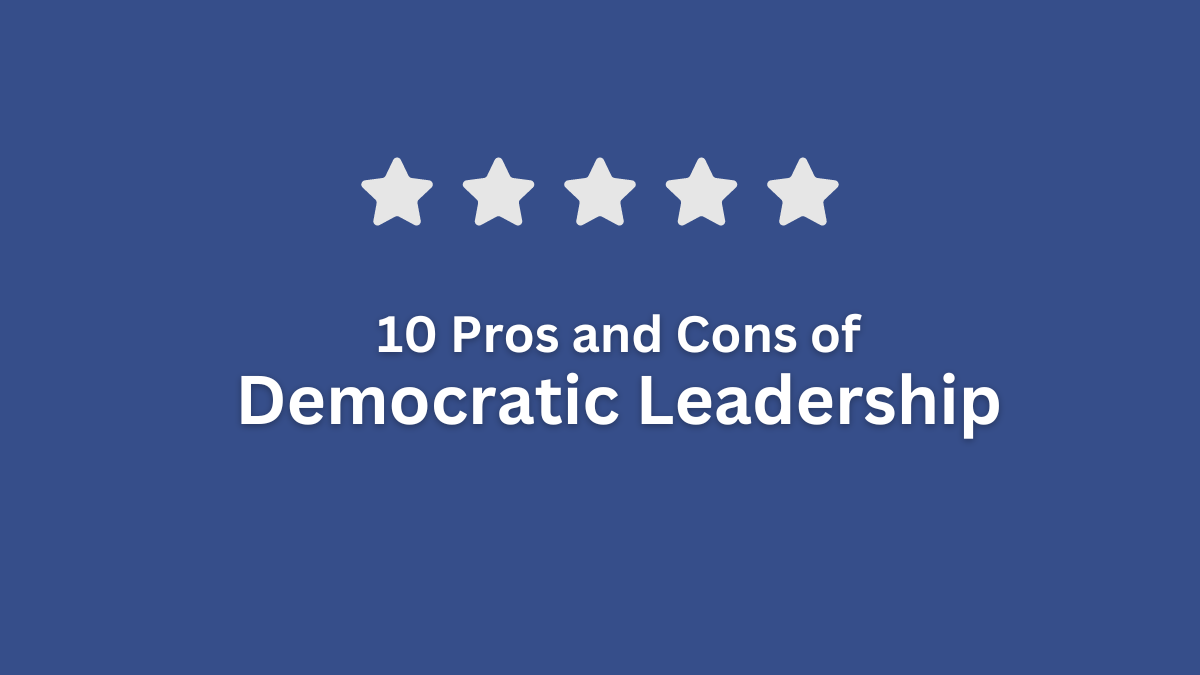What Is Democratic Leadership?
Democratic leadership is often seen as the opposite of autocratic leadership, where leaders make decisions unilaterally without much input from others. In a democratic style, leaders value the input of their team members, facilitating discussions and allowing everyone to have a say in decisions that affect the group or organization.
This leadership style is built on trust, open communication, collaboration, and creativity. The leader gathers information, listens to diverse opinions, and then works with the team to reach a consensus. Ultimately, the leader makes the final decision, but it’s usually one that reflects the collective input of the team.
How Democratic Leadership Works in Business
In a business context, democratic leadership creates a culture where employees feel engaged and valued. It’s especially effective in industries or companies that rely on innovation, creativity, and expert knowledge.
For example, tech companies like Google and startups often employ democratic leadership to foster innovation and ensure that employees contribute to the company’s direction.
In this environment, leaders encourage employees to voice their opinions, offer suggestions, and discuss strategies. This process allows leaders to tap into the collective intelligence of the group, which often leads to more innovative solutions and improved problem-solving.
5 Major Pros of Democratic Leadership in Business
Below are the 5 major advantages of democratic leadership in business:
Encourages Employee Engagement and Satisfaction
Democratic leadership promotes an inclusive environment where employees feel their contributions matter. Involving employees in decision-making boosts morale, increases job satisfaction, and makes them feel more engaged with the organization.
When people know their ideas are valued, they are more likely to be motivated and take ownership of their work. This can lead to higher productivity and better-quality results.
Fosters Creativity and Innovation
One of the most significant benefits of democratic leadership is that it encourages creativity and innovation. In today’s rapidly changing business world, companies that don’t innovate risk falling behind.
Democratic leaders bring together diverse ideas and viewpoints, sparking creativity that can lead to breakthrough innovations. This leadership style is particularly effective in industries like tech, marketing, and design, where new ideas are essential for staying competitive.
Builds Trust and Team Collaboration
Trust is the foundation of successful teams, and democratic leadership is excellent at building trust. By actively involving employees in decisions and discussions, leaders demonstrate that they value their team’s opinions and expertise.
This trust fosters a stronger sense of loyalty and collaboration. Team members feel comfortable working together, and they trust that their leader will listen to and support them.
Read More: Pros and Cons of Group Decision
Leverages Collective Knowledge for Better Decisions
Democratic leadership taps into the collective knowledge of the group. Since no single leader can have all the answers, drawing from the team’s diverse experiences and insights often leads to better, more informed decisions. This collaborative approach reduces the risk of poor decision-making because multiple perspectives are considered, helping to identify potential problems and opportunities.
Improves Employee Skill Development
In a democratic environment, employees are encouraged to think critically, contribute ideas, and solve problems. This process helps them develop valuable skills such as decision-making, communication, and teamwork.
Over time, employees become more confident in their abilities and more capable of taking on leadership roles themselves, creating a pipeline of future leaders within the organization.
5 Main Cons of Democratic Leadership in Business
Below are the five main disadvantages of democratic leadership in business:
Time-Consuming Decision-Making Process
One of the biggest drawbacks of democratic leadership is the amount of time it takes to reach a decision. Involving everyone in discussions and seeking consensus can slow down the process significantly.
In fast-paced environments or situations that require immediate action, this leadership style may not be suitable. A democratic approach might lead to missed opportunities or delays, especially when swift decisions are necessary for business survival.
Read More: Pros and Cons of Product Departmentalization
Risk of Groupthink
While democratic leadership encourages collaboration, it can also lead to groupthink. This happens when team members feel pressured to agree with the majority opinion, even if they have concerns.
As a result, critical thinking and alternative perspectives may be overlooked. When leaders prioritize harmony over constructive debate, the quality of decisions may suffer, leading to ineffective solutions.
Not Effective with Inexperienced Teams
Democratic leadership works best when team members are skilled, knowledgeable, and capable of making informed contributions. In teams where members lack experience or expertise, this style can be ineffective.
Less experienced employees may feel overwhelmed or unsure about how to contribute, and the leader may struggle to gather meaningful input. This can lead to poor decisions or put too much pressure on the leader to make up for the team’s deficiencies.
Read More: Pros and Cons of Authority Delegation
Can Create Confusion About the Authority
Because democratic leadership emphasizes shared decision-making, it can sometimes create confusion about who is in charge. Employees might become unclear about the chain of command or feel that the leader is not taking enough responsibility.
In certain situations, this lack of clear authority can lead to conflicts or a lack of direction, especially if the team is not aligned on key goals and priorities.
Difficulty in Making Tough Decisions
In business, not all decisions are easy, and sometimes leaders have to make tough calls that may not please everyone. In a democratic setting, the pressure to reach a consensus can make it difficult to make unpopular but necessary decisions.
If the leader bends too much to group opinions, they may hesitate or avoid making hard choices that could benefit the company in the long run. This can weaken the leader’s effectiveness and harm the business’s overall performance.
Read Next: Pros and Cons of Informal Organization
